FourFourTwo’s 100 most influential people in football right now: 50-41
Three high-profile gaffers, the world's biggest ego and everyone's favourite former ref make the cut in this section of our countdown
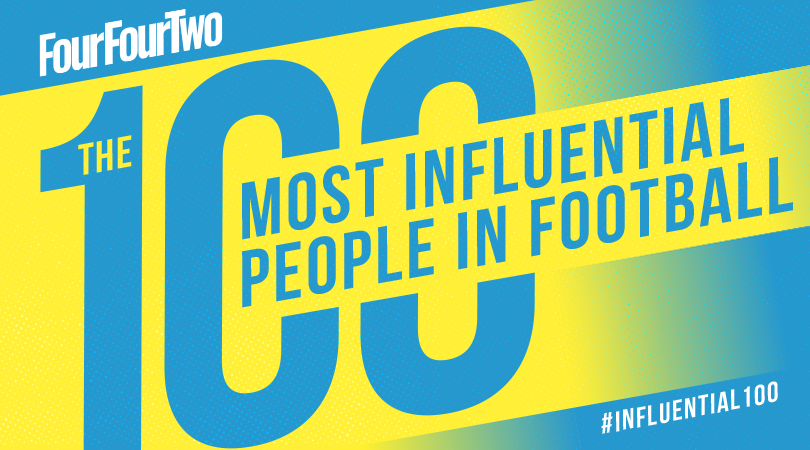
Words: Amit Katwala, Mike Holden, Alex Hess, Jeff Kassouf, Joe Brewin, Seb Stafford-Bloor.
50. Arsene Wenger
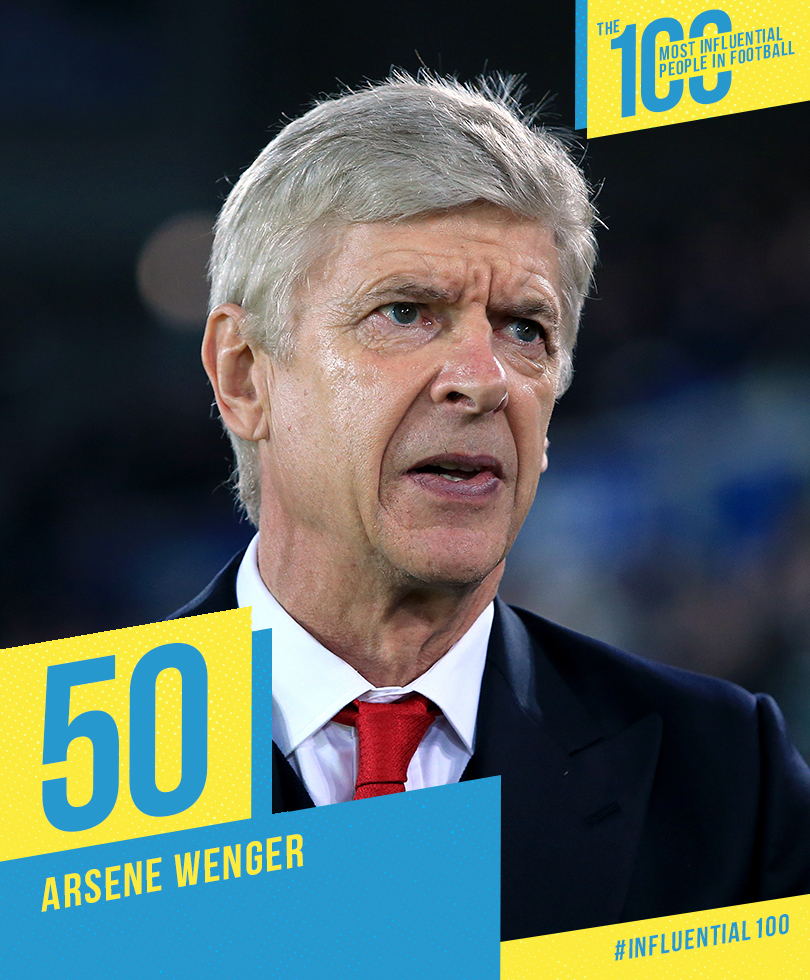
Over the last 20 years, Wenger has turned one of the biggest clubs in the country into a one-man show. His revolutionary approach to things like nutrition and not going to the pub the night before a match have been well documented, and helped him reach much early success – peaking with the famous ‘Invincibles’ side of 2004.
Since then, his influence within the club has only grown, even as on-field success has been harder to come by. It’s been noted that when (or if) Wenger leaves, there’s no one above him at the club who has any experience of hiring a manager.
It’s still unclear whether the 67-year-old will still be at the Emirates next season, although he said in a recent press conference that he’s already identifying transfer targets for the summer. Even if he doesn’t sign a new contract, his influence will continue to resonate at Arsenal, and through the English game as a whole, for years to come. AK
49. Zinedine Zidane
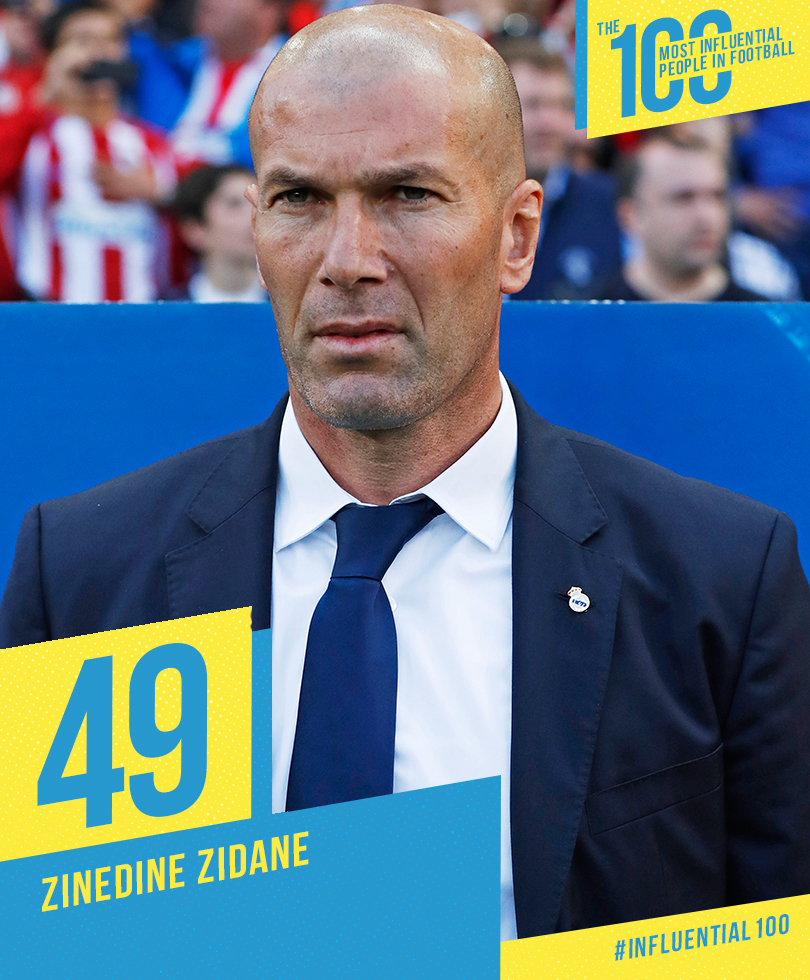
No team has won back-to-back European Cups since the great Milan side managed by Arrigo Sacchi in the late 1980s, but Zidane is now on the brink of that very achievement nearly 30 years on if his Real Madrid can defeat Juventus at the Millennium Stadium next month.
Get FourFourTwo Newsletter
The best features, fun and footballing quizzes, straight to your inbox every week.
And yet, a sizeable number of respected pundits remain unconvinced by his tactical prowess.
The logical explanation is that the Frenchman, besides commanding instant respect of players for his status as a world superstar and Madrid legend, is a coach for the modern era of high individualism among elite millennial players; a canny mediator who respects the power dynamics of a dressing room and does everything in his power to keep everything on an even keel. It certainly suits Cristiano Ronaldo, who continues to thrive at 32.
When a team stacked with big-game players continue deliver their best when it matters most, the subtleties between various systems barely matter. MH
48. Stan Kroenke
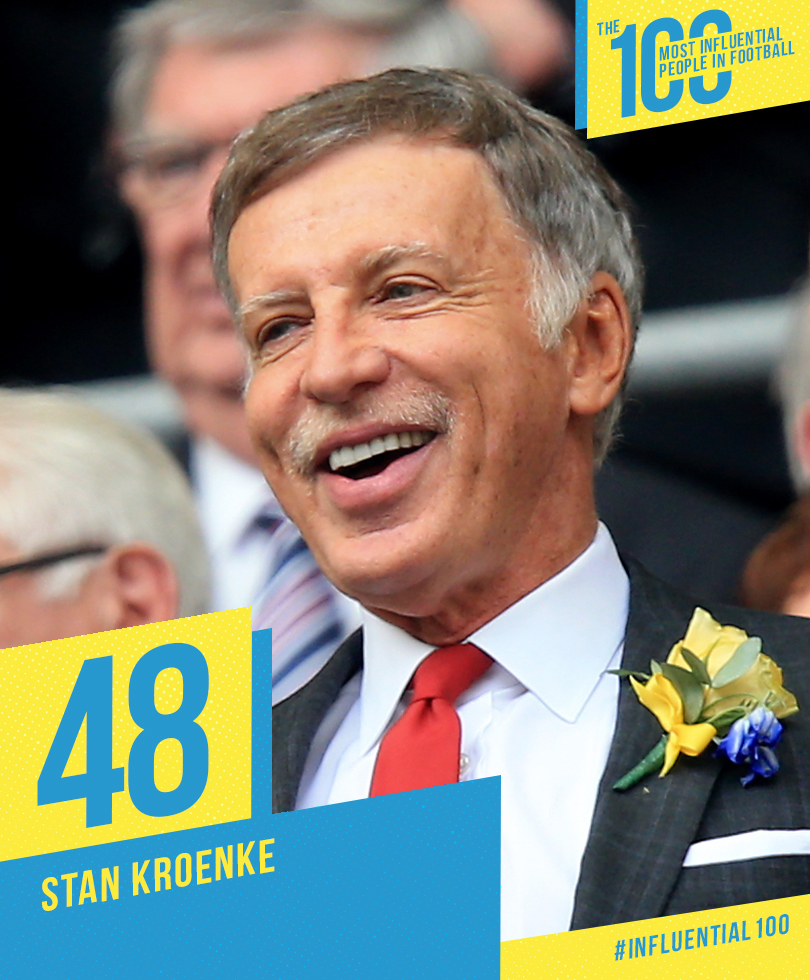
The man they call ‘Silent Stan’ because he hardly ever says anything has hired 15 coaches in the last 17 years – at the Denver Nuggets basketball team, Colorado Avalanche ice hockey team, and the St Louis Rams American football team, which he also owns. The fact that Arsene Wenger’s position at Arsenal has remained unassailable since Kroenke bought the club in 2011 says a lot about their relationship.
The 69-year-old American values Wenger’s ability to balance the books, and says it’s the Frenchman’s decision whether he wants to leave in the summer or not. If and when Wenger decides to go, Kroenke will face a hugely difficult choice for Arsenal’s next manager – particularly if the club, as looks likely, fails to qualify for next season’s Champions League.
Will we see Arsenal falling into a long slumber, or will Kroenke pump in investment and introduce another major player in the transfer market? AK
47. Zlatan Ibrahimovic
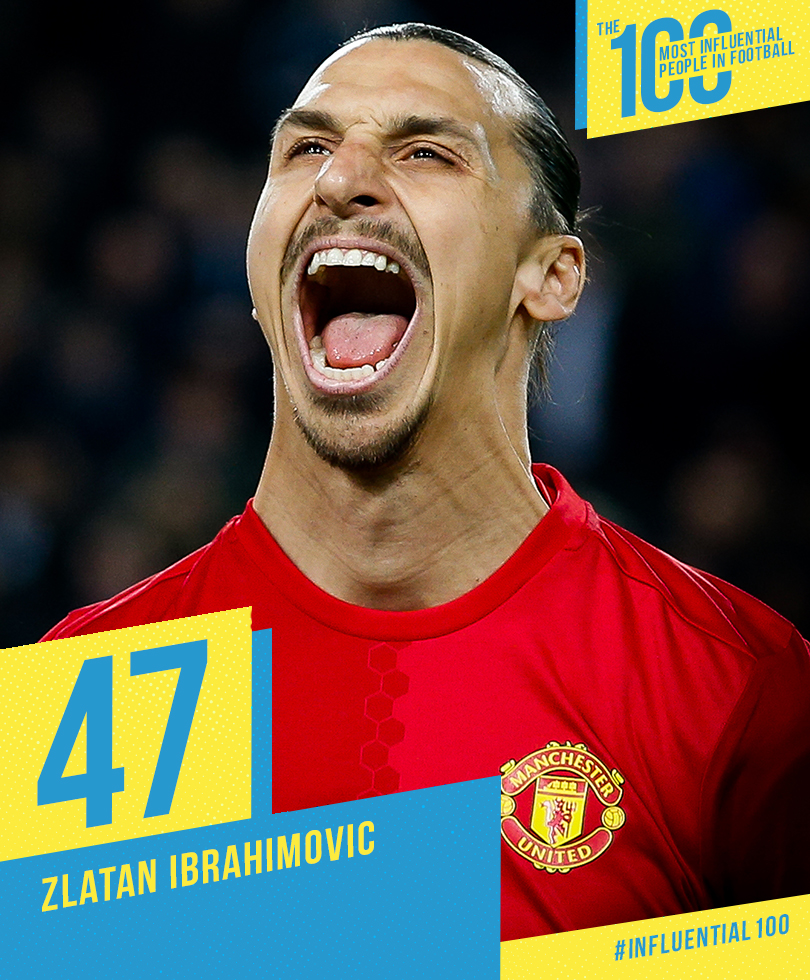
If England was Ibrahimovic’s final frontier, than he can safely consider it conquered. The country that, for so long, was so brazenly sceptical of whether the Swede’s languid talents matched up to his trash-talking facade has spent the last nine months fawning over his leadership, charisma and unrelenting goalscoring.
The player who once personified England’s “lazy foreigner” archetype has proven, in his own way, that he is among the most dedicated and disciplined sportspeople around: at 35 he still possesses the chiselled physique of a Greek god and a medal collection that is being added to as steadily as ever.
Ibrahimovic is at the forefront of the sport in another sense, too: the thirst to cultivate his own brand. Everything he offers to the public – be it through his interviews, social media accounts or his unabashedly self-mythologising autobiography – represents a carefully crafted addition to his own stage-managed persona. Ibrahimovic may well retire soon, but don’t expect him to go away. AH
46. Don Garber
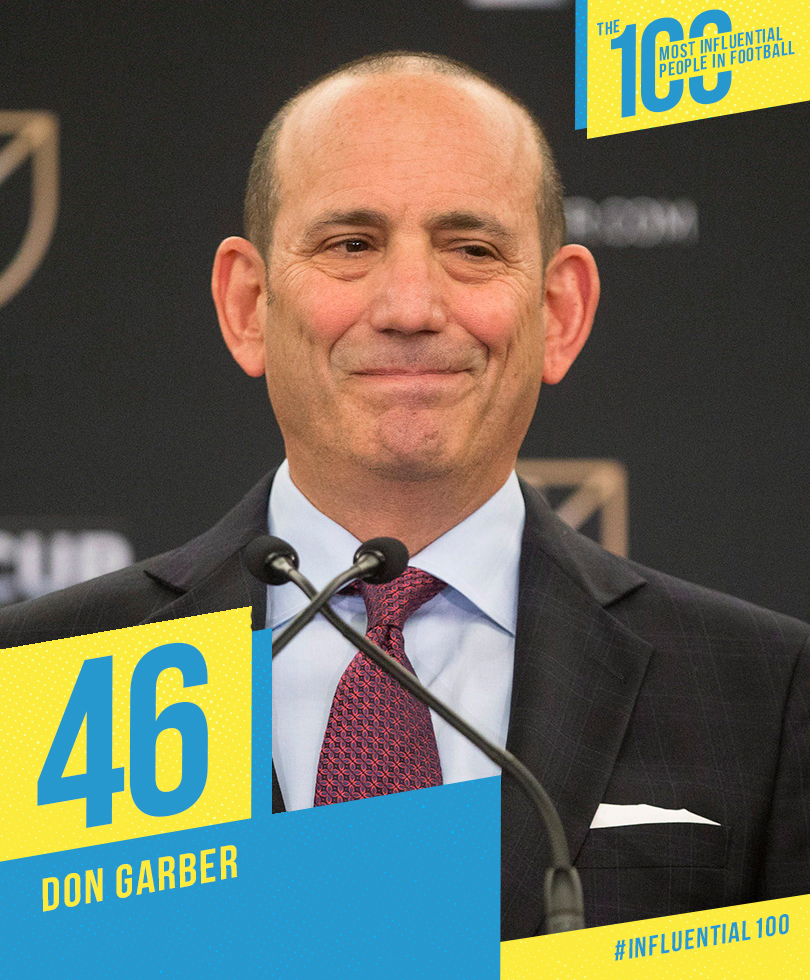
Major League Soccer was a struggling 10-team league when Garber arrived in 1999. The long-time NFL executive had plenty of sceptics back then – but he’s proved them wrong 10 times over since.
In 2017, MLS is a thriving 22-team league, with an arms race going on between would-be expansion candidates waiting in the wings. It has pushed itself well into the top 10 most-attended leagues in the world thanks to the addition of strong markets such as Seattle, who average over 42,000 fans per game.
Under Garber, MLS has become a progressive league, embracing initiatives like video assistant refereeing before most of its rivals. The single-entity league has embraced further investment in players in recent years, bolstering the middle and top ends of rosters.
Whether or not MLS would survive – a persistent question in Garber’s early days – is a thought of the past. Now, it’s a matter of how high it can climb. Garber’s aim of being one of the best leagues in the world in the next five-plus years is ambitious, but that’s exactly the point. JK
45. David Chung
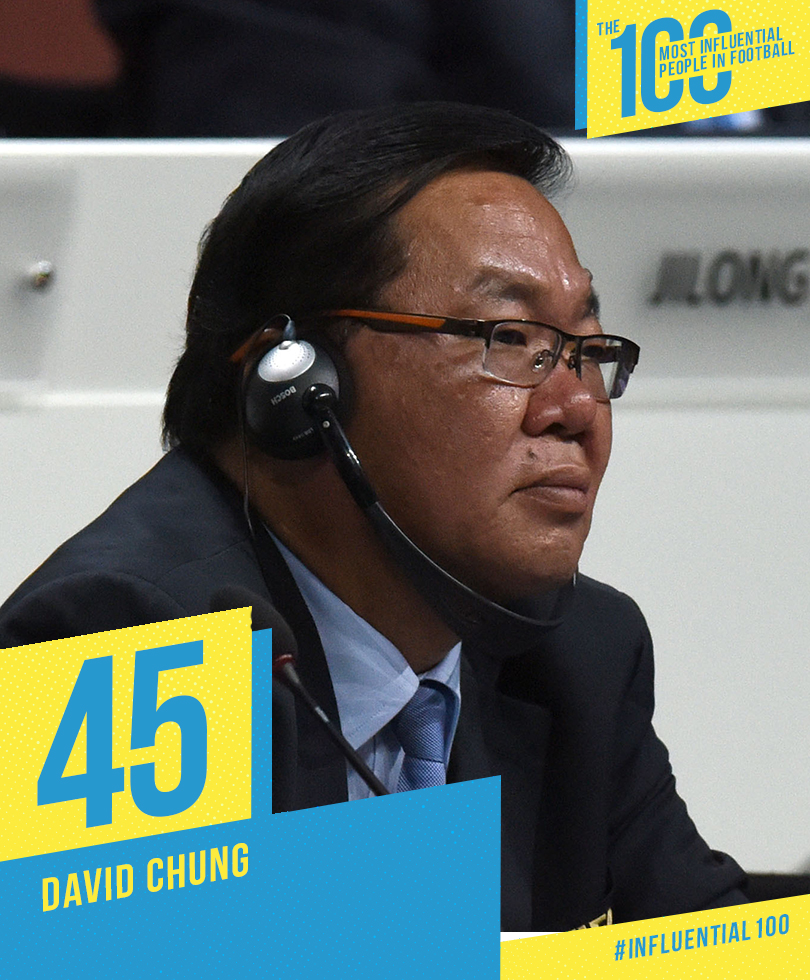
Papua-New Guinean Chung began serving a second term as president of the Oceania Football Confederation (OFC) in January 2015, having been unopposed for the role.
His job title, held since 2011, automatically means he holds significant sway within FIFA, where he is a vice-president and has a position on the ruling council.
Most pertinently, he influences where World Cups are to be held – this month, for example, Oceania backed CONCACAF’s request to have their mega 2026 joint-bid (which includes the USA, Canada and Mexico) process sped up for additional planning time.
Chung was once among Sepp Blatter's biggest supporters during the Swiss's tenure as FIFA president, which helped him boost the causes of the relative minnow nations under his stewardship. He has lived in Malaysia since 1985, and in July 2012 received an OBE.JB
44. Neymar

Now 25 and fast approaching the defining cycle of his career, Neymar is widely acknowledged to have been Barcelona’s most consistent performer this season, even though most of the big moments still belong to Lionel Messi.
Indeed, some pundits are tentatively beginning to offer the opinion that the Brazilian has now surpassed Messi and Cristiano Ronaldo as the world’s greatest player in terms of all-round contribution. According to them, a new era has already begun.
It’s a chorus predictably led by Neymar’s national team coach Tite, following his six goals in World Cup qualifying that made Brazil the first nation to qualify for Russia 2018.
The jaw-dropping finale in Barcelona’s stunning Champions League fightback against Paris Saint-Germain was all about Neymar, showing that he’s ready to step up to take the crown as the King of the Camp Nou, if required. It’s over to you, Leo. That contract isn’t going to sign itself. MH
43. Pierluigi Collina
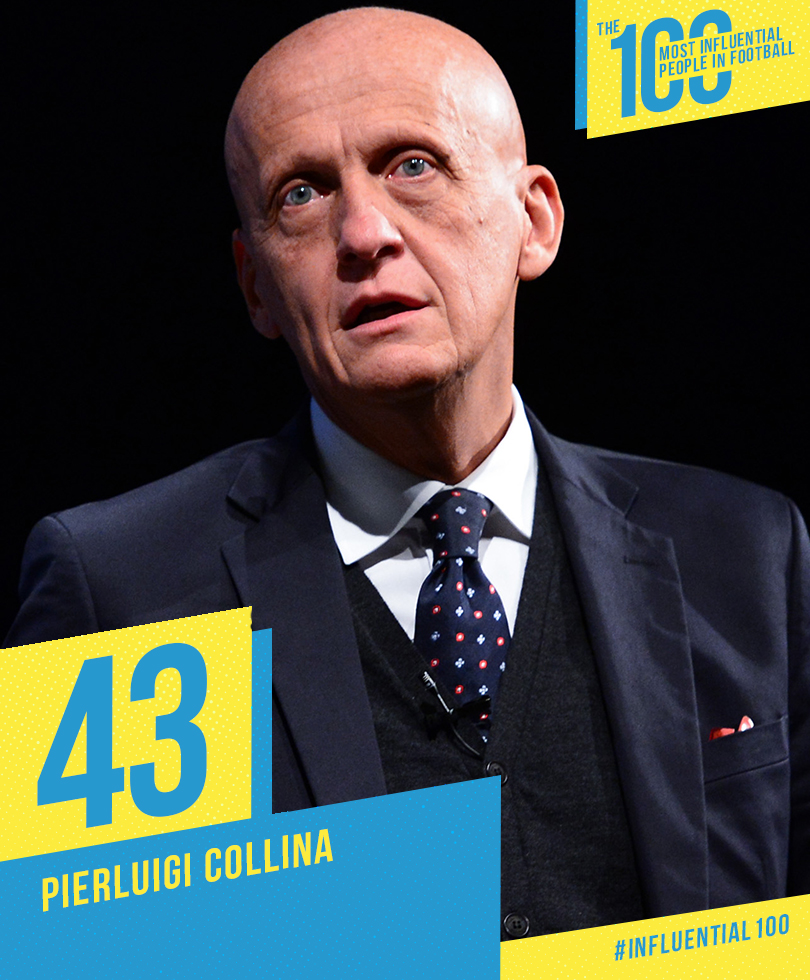
The first and only referee to feature on the cover of a football video game – unless they make the FIFA 18 selection process truly democratic (#TeamClattenburg) – Collina carved out a reputation as one of the best officials in football and won the prestigious referee of the year award six times.
The 57-year-old retired from refereeing in 2005 and now works as chief referee officer for UEFA, and the chairman of FIFA’s Referees’ Committee. As such, he’ll play a key role in deciding whether certain rule changes, which are being trialled at the moment, are introduced in the Champions League and at the World Cup.
The first, which looks like it will almost certainly be brought in at some point, is Video Assistant Referees. Further down the line, things like sin bins for dissent, or even changes to the rules around heading, are all a possibility. The IFAB sets the Laws of the Game, but it’s up to the individual organisations to decide whether to bring them in for their tournaments, so Collina could be key. AK
42. John W. Henry
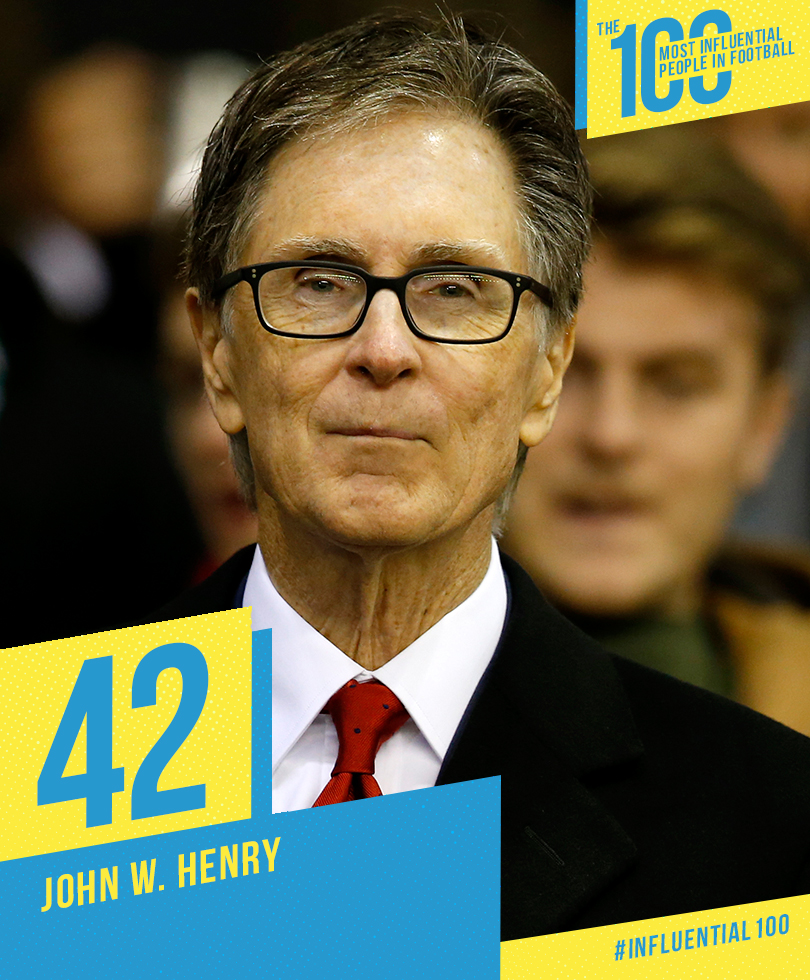
What Henry represents is as key to his influence as who he is. The Fenway Sports Group’s purchase of Liverpool in 2010 afforded him plenty of visibility, but it’s his neophyte approach to the industry which lends his voice such weight.
Henry is a noted advocate of sabermetrics – the empirical analysis of baseball – which would explain the shape and nature of Liverpool’s recruiting practices, and he is also not shy in making bold appointments.
The hiring of Jurgen Klopp was one of those, and although it hasn’t yet translated to on-pitch success for the Reds, it represented a genuinely forward-thinking move that has coincided with some necessary off-pitch upgrades – most notably, the expansion of Anfield, plus the £50m redevelopment of their academy site and proposed move away from Melwood.
The promotion of Michael Edwards from head of performance and analysis to sporting director last November, for instance, provided a pertinent example of Henry’s indifference to convention. SSB
41. Antonio Conte
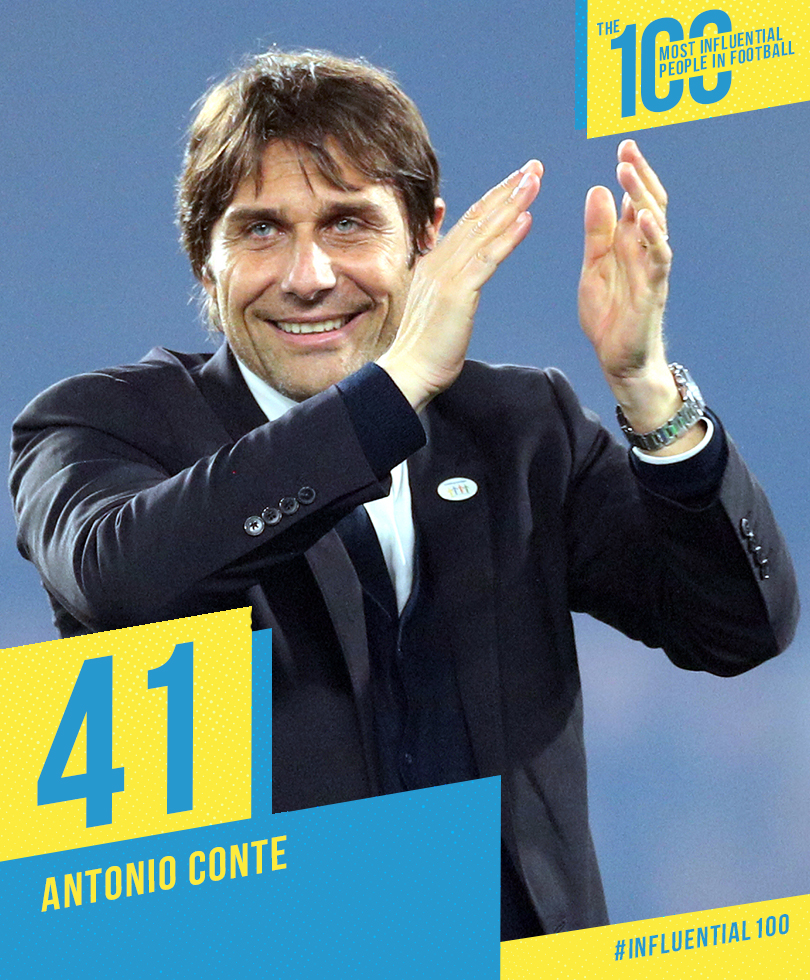
A star on the rise, Conte has just captured the Premier League title in his maiden Chelsea season – and, according to reports, is already being coveted by Barcelona to replace Luis Enrique next season.
Add that to the over-performance he provoked from the Italian national team at Euro 2016, and his creation of a Juventus side which remains dominant over Serie A to this day.
It’s a highly impressive body of work and one which, ultimately, has elevated him into the super coach category occupied by Jose Mourinho and Pep Guardiola.
Interestingly, all three have managed new English clubs this season, but it’s Conte who has comfortably performed at the highest level. Pitched somewhere between Mourinho’s pragmatism and Guardiola’s emphasis on attacking expression, he’s set to become – if he isn’t already – the newest ideologue to be revered across the continent. SSB
100-91 • 90-81 • 80-71 • 70-61 • 60-51 • 50-41 • 40-31 • 30-21 • 20-11 • 10-1
Joe was the Deputy Editor at FourFourTwo until 2022, having risen through the FFT academy and been on the brand since 2013 in various capacities.
By weekend and frustrating midweek night he is a Leicester City fan, and in 2020 co-wrote the autobiography of former Foxes winger Matt Piper – subsequently listed for both the Telegraph and William Hill Sports Book of the Year awards.

